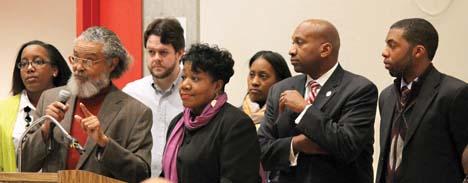January 12, 2012

State Rep. Byron Rushing spoke during a forum at the Dudley Sq. BPL branch. At right are State Reps. Gloria Fox, Russell Holmes and Carlos Henriquez.
More than 250 people crowded into the Dudley Square Branch Library on Saturday to voice their concerns about a pair of bills that would implement a “three strikes” sentencing policy in Massachusetts, claiming the legislation will disproportionately affect communities of color.
Although the pair of habitual offender bills – Senate Bill 2504 and House Bill 3811 – are currently in conference with state legislators, several elected officials and criminal justice advocates took part in a panel to urge those in attendance to educate themselves and their neighbors about the proposed sentencing changes. They urged opponents to contact state lawmakers in hopes of removing aspects of both bills they believe will extend prison time for non-violent offenders.
State Representative Russell Holmes said those in opposition to the bill would need to move quickly and make “tactical decisions” about which legislators the late-arriving reform campaign should target.
“These are bills that are very important to our community and we want to identify people with a majority of people of color in their district,” Holmes said, reminding those in attendance that outside of the state’s 8-member Black and Latino Caucus, only four white lawmakers voted against the bills in their current form.
One of those no votes, State Representative William Brownsberger, was in attendance and received a standing ovation from the crowd and accolades from State Representative Gloria Fox for recognizing that the bill “isn’t a black and Latino issue, [the bill] is a human issue.”
Legislators began calling for a revised approach to habitual offenders following the December 2010 murder of Woburn Police Officer John Maguire during an armed robbery by a career criminal who had been paroled despite a lengthy criminal record. A revised bill could be completed and ready for a vote as early as Thursday, Jan. 12.
The current Senate bill was met with a warmer reception by those in attendance. Under the proposed bill, adults convicted of three out of a list of sixty violent or dangerous offenses would receive the maximum prison sentence for the third offense with no opportunities for parole. That bill would require anyone charged with any of these offenses a first or second time to serve two-thirds of their sentence before being eligible for parole.
Additionally, the Senate bill would double the amount of drugs needed to trigger low-level trafficking offenses from four to eight grams and would cut down the distance of school zone laws from 1,000 to 500 feet from school property. Under current school zone laws, drug offenses within 1,000 feet carry a mandatory two-year sentence.
Conversely, the House bill would change existing laws so any felony convictions out of the state’s 688 possible felony charges that result in time served in a state penitentiary would count towards the first two “strikes”, with any third felony conviction resulting in a maximum sentence.
Barbra Dugan, an advocate for Families Against Mandatory Minimums, urged people to fully understand the differences between the two bills before contacting policymakers in order to avoid canceling some of the reforms she felt would benefit communities most impacted by long-term incarceration.
“You have to understand the Senate bill is very different from the House bill,” Dugan said. “The House bill is only looking at habitual offender reforms but the Senate is a very different situation. [The Senate bill] has some good stuff in it. It has some bad stuff in it, but you need to know exactly where the problems are when you choose to speak up.”
Boston NAACP chapter president Michael Curry said that while creating awareness about the habitual offender laws was a valuable effort, people in opposition to the bill will need to put actions to their words if they hope to effect any change on the final product.
“The way you win this game is you bring the numbers,” Curry said. “It’s one thing to talk about this issue, but I am asking you to go to the State House and oppose the parts of this bill that will impact the community. You need to be heard.”
Topics:



